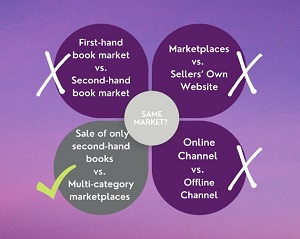- within Tax, Media, Telecoms, IT, Entertainment and International Law topic(s)
- with readers working within the Utilities industries
On July 18th, 2022, the Turkish Competition Authority (the "TCA") published its decision ("Decision") concerning Nadirkitap's practices in the market for intermediary platform services for the sale of second-hand books. The TCA imposed Nadirkitap an administrative fine of TRY 346,765.63 (approx. EUR 13,000) on the following grounds:
- Nadirkitap is a dominant player in the market for intermediary e-marketplace services for the sale of second-hand books,
- Nadirkitap abused its dominant position by preventing sellers' access to their inventory data on its e-marketplace without any just cause.
How Does TCA Define the Market in relation to Nadirkitap's Practices?
In its Decision, TCA evaluated whether there is a substitution
relationship between the first-hand book market and the second-hand
book market in terms of supply and demand by assessing:  (i) ease of access to
distribution channels in the relevant market and (ii) the
motivation behind consumer behaviour. Considering it is less costly
to reach first-hand book distribution channels than second-hand
booksellers and it is difficult for undertakings to accumulate a
sufficient inventory of second-hand booksellers, the TCA
decided there is no substitution relationship
between these markets in terms of supply. Additionally,
since more than half of the customers have non-price motivations
such as environmental awareness and nostalgic feeling, and
therefore average second-hand book prices have been higher than
first-hand book prices since 2015, TCA decided that there
is no substitution relationship in terms of demand between the two
products.
(i) ease of access to
distribution channels in the relevant market and (ii) the
motivation behind consumer behaviour. Considering it is less costly
to reach first-hand book distribution channels than second-hand
booksellers and it is difficult for undertakings to accumulate a
sufficient inventory of second-hand booksellers, the TCA
decided there is no substitution relationship
between these markets in terms of supply. Additionally,
since more than half of the customers have non-price motivations
such as environmental awareness and nostalgic feeling, and
therefore average second-hand book prices have been higher than
first-hand book prices since 2015, TCA decided that there
is no substitution relationship in terms of demand between the two
products.
Marketplaces vs. Sellers' Own Website
Moreover, it is determined that marketplaces and sellers selling on their own online channel operate in different markets due to the distinction between those channels regarding consumer's purchasing experience and the range of potential customers. The TCA stated that saving time, product variety and comparison opportunities provided by marketplaces weaken substitutability between marketplaces and sellers selling on their own online channel (i.e. website) in the eye of consumers, which is the first user of the marketplaces. In terms of second-hand booksellers, also a user of marketplaces, sellers selling on their own online channel are not an alternative to marketplaces, evidently because, these websites sell on their own behalf, and third parties cannot sell on these websites.
Online Channel vs. Offline Channel
The TCA also determined that the online and traditional channel are two separate markets. The online channel provides accessibility, time saving, ease of use, wider variety of products, decrease in cost of comparison, access to more sellers and personalized search results.
Lastly, the TCA decided that marketplaces selling only second-hand books and multi-category marketplaces operate in the same market.
What is the Effect of Data Portability on Competition?
Data can be defined as arrangement of all kinds of information and facts in a way that makes sense and can be evaluated by human beings1. Since data has become an important component for the competitiveness of undertakings, it is also on the radar of competition authorities. Data is at the centre of the digital economy and data mobility is required to allow consumers to easily switch between platforms and experience varying services and to provide incentives for businesses to innovate2. Yet there is great inequality in access to data3. Data is invaluable for developing and providing digital services, the scale of data is directly proportionate with the competitive advantage it provides to undertakings. On the other hand, it creates potential entry barriers and prevents expansion of smaller enterprises who do not have access to such data.
Restriction of data portability within the scope of competition law can be addressed from several different perspectives. First of all, due to the switching costs, data owners may choose to stay on the platform they first signed on to if they find it burdensome to upload the same set of data to another platform. Therefore, limiting data portability can reduce competition and innovation in the market by making it difficult for users to benefit from more than one platform for the same service. In other words, preventing data portability also prevents multi-homing.
In addition, these restrictions may increase the costs of competitors as they force competitors to use additional resources to encourage the use of their platforms. In this framework, restriction of data portability by a dominant undertaking may be considered as exclusionary since it causes entry barriers for competitors by creating artificial transition costs.
What is the Nature of Nadirkitap's Practices?
The TCA determined that Nadirkitap has been denying its users, which are second-hand book sellers, access to their own data including basic information regarding products sold on Nadirkitap. Although manually uploading data to a competing marketplace is still possible, the cost of doing so is unreasonably more than transferring the already existing data on Nadirkitap, considering an average user has up to 50.000 books in their inventory.
The TCA also determined that Nadirkitap accounts of users who migrated said data to a competing marketplace has been suspended until the transferred data is removed from the competitors e-marketplace. Users are therefore forced to remove migrated data from competing marketplaces since Nadirkitap is an important commercial partner for second-hand book sellers and sellers simply cannot afford to have their Nadirkitap account suspended. Therefore, prevention of data portability by Nadirkitap increased switching costs while reducing sellers' motivation to work with any other competing e-marketplaces.
Is There a Debate on the Ownership Status of Data?
Considering that data on Nadirkitap is provided by second-hand booksellers and significant effort is put into compiling said data by second-hand booksellers, the TCA concluded that basic information regarding books belongs to seller and not Nadirkitap.
Why is This an Important Decision?
 The TCA determined
that Nadirkitap abused its dominant position in the market for
intermediary platform services for the sale of second-hand books by
not allowing sellers access to their own data on the Nadirkitap
marketplace without any just cause. The TCA also clarified that
Nadirkitap must provide any seller, who requests, with accurate and
clear data on their inventory free of charge.
The TCA determined
that Nadirkitap abused its dominant position in the market for
intermediary platform services for the sale of second-hand books by
not allowing sellers access to their own data on the Nadirkitap
marketplace without any just cause. The TCA also clarified that
Nadirkitap must provide any seller, who requests, with accurate and
clear data on their inventory free of charge.
Apart from being the first ever decision whereby the TCA imposes a data portability obligation on an e-marketplace to preserve effective competition, the TCA defines separate markets and comments on substitutable products. More importantly, the TCA also clarifies how to ensure data portability in these markets.
Footnotes
1 Ateş, M. "Veri Tabanlarının Hukuki Koruması." Ankara Üniversitesi Hukuk Fakültesi Dergisi 55, no. 1 (2006): 62–63.
2 Furman, Jason. "Unlocking Digital Competition, Report of the Digital Competition Expert Panel." GOV.UK. HM Treasury, March 13, 2019. Accessed August 11, 2022. https://www.gov.uk/government/publications/unlocking-digital-competition-report-of-the-digital-competition-expert-panel .
3 "A New pro-Competition Regime for Digital Markets - Gov.uk." Accessed August 11, 2022. https://assets.publishing.service.gov.uk/media/5fce7567e90e07562f98286c/Digital_Taskforce_-_Advice.pdf.
The content of this article is intended to provide a general guide to the subject matter. Specialist advice should be sought about your specific circumstances.


